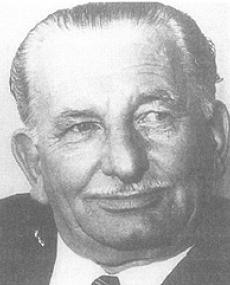
Raymond Francis (Ray) Budd was born on 9 June 1910 in Mowbray, Cape Town. He was the only child of Robert and Ada Lea Budd. His father, originally from England, was in the printing trade. Budd was educated at Rondebosch High School and the Technical College, both in Cape Town. He served his apprenticeship in Cape Town as a fitter at the Salt River Workshops of the South African Railways and also at Table Bay Harbour. Upon completing his apprenticeship Budd joined the Cape Town branch of the Amalgamated Engineering Union (AEU) on 25 May 1933.
Apart from the position of Treasurer, Budd served in all official positions in the Union.On 5 November 1938, Budd married Eileen Mary Alexander. From 1939, Budd was selected by the Government to be part of the National Board for Sheltered Employment for Disabled Servicemen. Budd was also a shop steward and in 1943 he took over the position of honorary part-time district secretary of the Cape Town branch of the AEU from his father-in-law.
In 1946 Budd became the first president of the Cape Federation of LabourUnions, which, later, would become the Western Province Local Committee of the South African Trades and Labour Council (SATLC).
In 1949 Budd resigned as the honorary part-time district secretary of the Cape Town branch of the AEU. That year Budd was elected as the first full-time Chair of the South African Council of the union, a position he would be re-elected to for every three years until 1960, when the branch removed itself from its British counterparts and made Budd the national Chair. Budd held this position until his death.
From 1949 to 1950, Budd was the vice-president of the South African Trades and Labour Council (SATLC). Budd served on the Unity Committee in 1954 which attempted to squash the Industrial Conciliation Bill, which was introduced by the Apartheid government to restrict mixed race trade unions. The Bill would also refuse Black workers the right to belong to a trade union. The Unity Committee failed to achieve most of its goals but it was able to form the Trade Union Council of South Africa (TUCSA), which was one of the few racially open trade federations in South Africa. Budd served as a part of TUCSA's national executive committee, National Management Committee as well as the Officers Committee. In 1957 while representing the Mechanics Unions at the Metal Trades Committee of the International Labour Organisation, held in Geneva, Budd was elected as the Chair of the Workers Group on Automations Committee.
Budd was elected president of TUCSA from 1959 to 1961. In 1960 Budd served on the National Board for the Commission of Enquiry into Compulsory Motor Vehicle Insurance as well as the Economic Advisory Council to Prime Minister Hendrik Verwoerd. In 1966 the AEU disaffiliated with TUCSA, minimising the amount of contact between Budd and TUCSA.
Budd died In Tonbridge Wells, London, England on 14 August 1974.